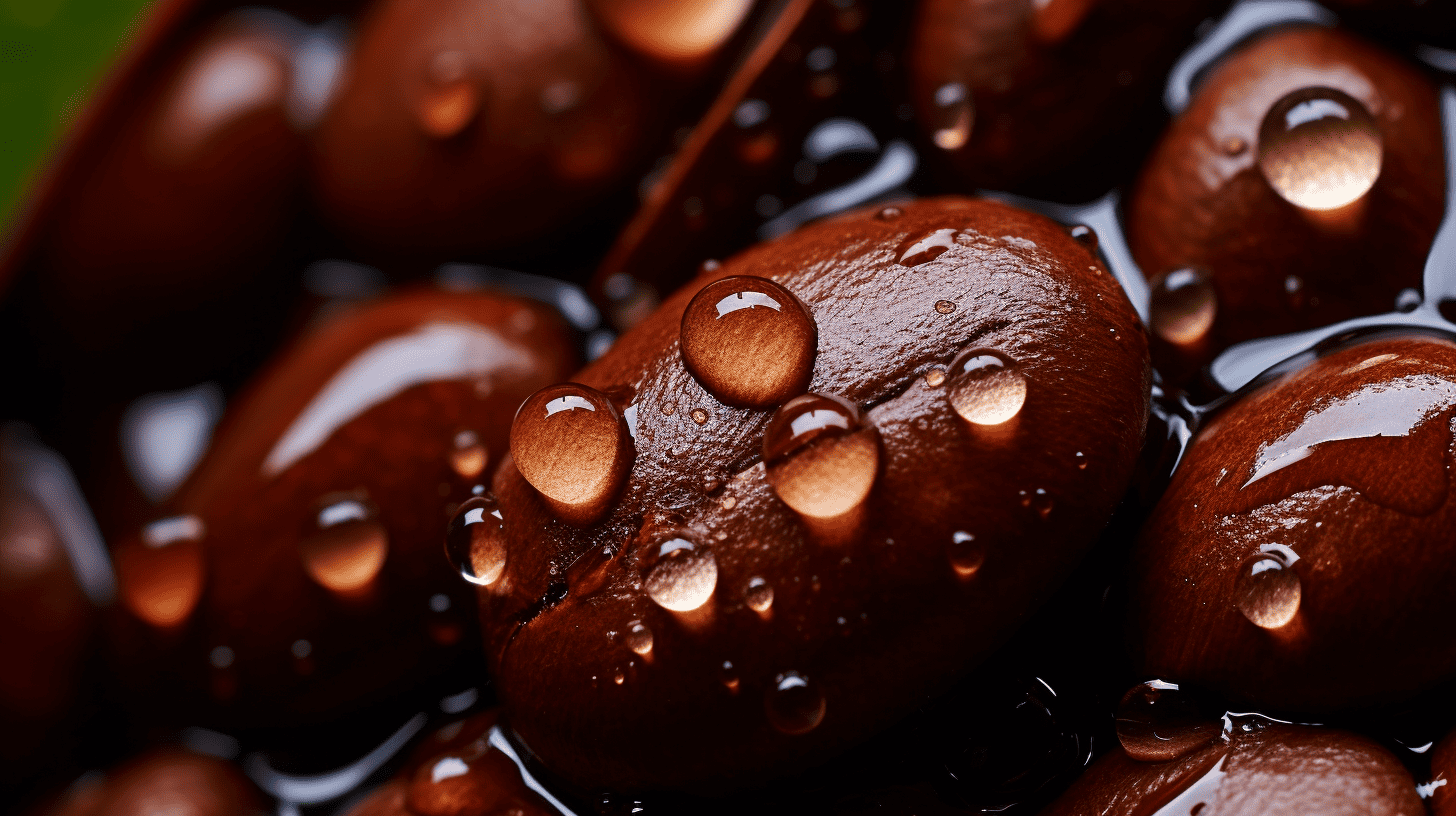Millions of people around the world enjoy coffee as a favorite beverage. It’s a great way to start the day, perk up in the afternoon, or enjoy it with friends. One popular way to drink coffee is with milk. However, there may be more coffee calories with milk which can significantly affect the number of calories in your cup?
Whole milk is the highest in fat and calories among all types of milk. A single cup of whole milk contains around 150 calories, while skimmed milk contains only about 80 calories per cup. If you’re looking for a lower-calorie option, plant-based milks like almond and soy milk are also excellent choices. A cup of unsweetened almond or soy milk contains only 30-40 calories.
Adding Milk Into Your Coffee Cup
| Type of Milk | Calories per Ounce |
|---|---|
| Whole Milk | 18 |
| 2% Milk | 15 |
| 1% Milk | 12 |
| Skim Milk | 10 |
| Almond Milk | 7 |
| Soy Milk | 8 |
| Coconut Milk | 12 |
If you prefer your coffee with steamed milk, then lattes are probably your go-to choice. However, be aware that lattes can have significantly more calories than black coffee with just a splash of milk. A typical latte made with whole milk can contain up to 300 calories per cup! Opting for skimmed or almond milk instead can help cut down on unnecessary calories.
Espresso shots themselves contain very few calories – only about 5 per shot! But adding sugar or any dairy will quickly increase the calorie count. For example, adding one tablespoon of sugar and two tablespoons of whole milk to your espresso will add around 60 extra calories.
It’s important to note that not all plant-based milks are created equal make sure to read nutrition labels carefully before choosing which type of plant-based milk to use.
Understanding Coffee Calories with Milk
Coffee is a staple for many people worldwide, and adding milk to it is a common practice. However, many people don’t realize that adding milk also adds calories to their coffee cup. The number of calories added depends on the amount of milk used.
For example, a single tablespoon of whole milk contains approximately 9 calories. If you add two tablespoons of whole milk to your coffee, you are adding 18 calories. This may not seem like much, but if you drink multiple cups of coffee per day with two tablespoons of whole milk each time, those extra calories can add up quickly.
The amount of milk used affects the calorie count
It’s important to note that the amount of milk used in your plain coffee greatly affects the calorie count. For instance, if you use four tablespoons (1/4 cup) of whole milk in your coffee instead of two tablespoons, you are adding an additional 36 calories. That’s almost double the amount compared to just using two tablespoons.
If you’re looking to cut back on calories, consider using less milk or switching to a lower-calorie alternative such as almond or soy milk.
Different types of milk have other calorie counts
Not all kinds of milk are created equal one cup (240 ml) of whole cow’s milk contains approximately 150-160 calories, while one cup (240 ml) of skim or low-fat cow’s milk contains only about 80-90 calories.
Non-dairy milks such as almond and soy also have varying calorie counts depending on whether they are sweetened or unsweetened. Sweetened versions will typically have more calories than unsweetened versions.
Sweeteners and flavorings also add calories to coffee
In addition to adding extra calories through the use of milk, sweeteners and flavorings can also contribute to the calorie count in your coffee. For example, one tablespoon of granulated sugar contains approximately 49 calories. If you add two tablespoons of sugar to your coffee, that’s an additional 98 calories.
Flavored syrups such as vanilla or caramel can also add significant calories to your coffee. One pump (1/4 oz) of flavored syrup typically contains around 20-25 calories. Adding four pumps of syrup to your coffee adds an additional 80-100 calories. This will make a high calorie drink that may not be good for you
Importance of Monitoring Calorie Intake in Coffee Drinks with Milk and Sugar
Choosing the right food and drink options is crucial for maintaining a healthy diet. One popular beverage that many people consume daily is coffee. However, adding milk and sugar to coffee can quickly increase its calorie count. Monitoring calorie intake in coffee drinks with milk and sugar is essential for those who want to maintain a healthy weight or lose weight.
More Calories in Coffee Drinks with Milk and Sugar
Coffee drinks with milk and sugar can contain significantly more calories than black coffee. For example, a cup of black coffee has only two calories, while a cup of latte with whole milk contains around 200 calories. This significant difference in calorie content can hinder weight loss efforts if not appropriately monitored.
Carbs Content in Coffee Drinks
Adding milk to coffee can also increase the carb content of the drink but will not change caffeine levels. Carbs are an essential energy source for the body, but consuming too many carbs at once can cause blood sugar levels to spike, leading to energy crashes later in the day. Choosing low-fat milk or alternative milk options such as almond or soy milk can help reduce carb intake while still providing enough energy to get through the day.
Fewer Calories for Weight Loss Goals
For those looking to lose weight, monitoring calorie intake is crucial. Consuming more calories than needed will lead to weight gain instead of loss. Individuals can reduce their calorie intake without sacrificing taste by choosing low-fat or alternative milk options when making coffee drinks.
Food Choices Impact Weight Loss Efforts
It’s important to remember that monitoring calorie intake isn’t just about what’s added to your coffee; it’s also about other food choices throughout the day. Consuming high-calorie foods and coffee drinks will make it difficult to achieve weight loss goals. Instead, incorporate nutrient-dense foods such as fruits, vegetables, lean proteins, and whole grains into your diet.
Risks of High-Calorie Additions and Added Sugars
Video Summary for Coffee Calories with Milk:
- Coffee with milk can be a better option for weight loss than coffee with sugar or cream.
- Different types of milk or milk alternatives have varying nutritional information, which can help you decrease the number of calories you get from coffee.
- The problem with coffee is that people tend to add calorie-dense ingredients to make it taste better, which can add up to a significant amount of calories if not counted.
- Coffee with milk can be part of a weight loss plan, but you must be aware of how many calories you consume and factor them into your overall diet.
High-Calorie Additions and Added Sugars in Sweetened Coffee Drinks with Milk and Sugar can lead to health issues.
Consuming sweetened coffee drinks with added sugar and fat can lead to weight gain and other health problems. Many coffee shops offer a variety of flavored syrups, whipped cream, and sugary toppings that can add hundreds of calories to your drink. These high-calorie additions may taste delicious but can negatively affect our health.
Added Sugar: A Risk for Heart Disease
Too much sugar can increase the risk of heart disease and other chronic illnesses. According to the American Heart Association, women should consume no more than 6 teaspoons (25 grams) of added sugar daily, while men should consume no more than 9 teaspoons (36 grams) daily. However, a single sweetened coffee drink can contain up to 25 teaspoons of sugar! This is well over the recommended daily limit for both men and women.
In addition to increasing the risk of heart disease, consuming too much sugar has been linked to other health problems such as obesity, type 2 diabetes, and tooth decay. Choosing healthier options like unsweetened or plant-based milk can provide health benefits without the added sugars.
Healthier Options: Unsweetened Milk or Plant-Based Milk
Unsweetened or plant-based milk is an excellent alternative to sweetened coffee drinks with added sugars. They provide essential nutrients like calcium and vitamin D without adding extra calories. For example, a cup of unsweetened almond milk contains only 30 calories compared to a cup of whole milk with 150 calories.
Plant-based milk like almond, soy, or oat milk is also great for lactose intolerant or vegans. These kinds of milk are often fortified with vitamins and minerals making them a healthy alternative to dairy products.
Natural Sweeteners: Honey or Maple Syrup
Natural sweeteners like honey or maple syrup can better replace processed sugars. These sweeteners are less refined and contain more nutrients than white sugar. Honey, for example, contains antioxidants and has antibacterial properties that can help boost the immune system.
However, it is important to remember that even natural sweeteners should be consumed in moderation as they still contain calories. One teaspoon of honey contains 21 calories, while one tablespoon of maple syrup contains 52 calories in your beverages.
Mindful Consumption: Maintaining a Healthy Lifestyle
Being mindful of our foods and drinks can help us maintain a healthy lifestyle. Choosing healthier options like unsweetened milk or plant-based milk and adding natural sweeteners like honey or maple syrup can provide health benefits without the added sugars. It is also important to consider portion sizes and limit high-calorie additions like whipped cream or flavored syrups.
Healthy Amount of Coffee to Drink and Calories in Different Coffee Drinks
Plain Brewed Coffee: A Low-Calorie Beverage
If you are watching your calorie intake but still want to enjoy a cup of coffee, plain brewed coffee is a good choice. It is an excellent low-calorie beverage option with only five calories in a 16-ounce serving. Plus, it has been shown that drinking coffee in moderation can have health benefits, such as reducing the risk of type 2 diabetes and liver disease.
However, keep in mind that not all coffee drinks are created equal. Cappuccinos and mochas can have high-calorie counts due to added milk and syrups.
High-Calorie Counts in Popular Coffee Drinks
For instance, a 16-ounce Starbucks latte with whole milk can contain over 200 calories. If you add whipped cream or flavored syrup, the calorie count can be even higher. Similarly, a medium-sized Dunkin’ Donuts caramel macchiato contains around 250 calories.
Reducing Calorie Content in Coffee Drinks
If you want to reduce the calorie content of your coffee drink while still enjoying its taste and flavor profile, there are several ways to do so:
Calories in Different Types of Iced Coffee and Caramel Iced Coffee
Iced coffee is a popular beverage choice, especially during the warmer months. It’s refreshing and energizing and can be customized to suit individual taste preferences. However, it’s important to note that not all iced coffees are created equal regarding calorie count. In particular, caramel iced coffee can pack a high-caloric punch with up to 400 calories per serving.
Types of Iced Coffee
There are various types available on the market. Some popular options include frappuccinos and lattes. Frappuccinos are typically made with ice, milk, and flavored syrups or sauces blended into a smoothie-like consistency. Lattes consist of espresso shots mixed with steamed milk and topped with foam.
Calorie Count Variations
The calorie count for different types of iced coffee can vary greatly depending on serving size and the ingredients used. For instance, a grande caramel iced coffee from Starbucks contains approximately 250 calories, while a medium Dunkin’ Donuts caramel iced coffee with cream has around 260 calories.
Impact of Milk Type
It’s worth noting that the type of milk used in your iced coffee can significantly impact its overall calorie count. Whole milk tends to have a higher fat content than skim or almond milk, which can add extra calories to your drink. For example, using whole milk instead of skim milk in a medium Dunkin’ Donuts caramel iced coffee increases the calorie count from 210 to 260 calories.
Flavored Syrup Considerations
Another factor that contributes to the calorie count in an iced coffee is the use of flavored syrups or sauces. While they may add delicious flavoring to your drink, some types contain high amounts of sugar, which also translates into added calories. A tablespoon (15 ml) of caramel syrup contains around 52 calories and 12 grams of sugar. Therefore, it’s essential to be mindful of the amount of flavored syrup added to your drink.
How Many Calories in a Cappuccino and Tracking with MyNetDiary Diet Apps
Cappuccino Calories: How Many Are There?
Cappuccinos are a popular choice for many people. But how many calories are in a cappuccino? On average, a cappuccino contains around 120 calories. However, the number of calories can vary depending on the type of milk used.
For example, if you opt for whole milk instead of skim or almond milk, your cappuccino will contain more calories. Similarly, if you add sugar or syrup to your drink, the calorie count will increase even further.
Tracking Your Cappuccino Calories with MyNetDiary Diet Apps
If you’re trying to keep track of your calorie intake and maintain a balanced diet, using an app like MyNetDiary Diet can be incredibly helpful. This app allows you to input your preferred type of milk and adjust serving sizes to track calorie intake accurately.
For example, you order a cappuccino with almond milk from your local coffee shop. Using MyNetDiary Diet, you can input this information and get an accurate reading of how many calories are in your drink.
The app also provides nutritional information for other coffee drinks, such as lattes and mochas. By using this tool regularly, individuals can make informed decisions about their coffee consumption and ensure they stay within their daily caloric limits.
Making Informed Decisions About Your Coffee Consumption
While keeping track of your calorie intake when drinking coffee (or any other beverage) is essential, there’s no need to give up your favorite drinks altogether. Instead, make informed decisions about what you consume and how often.
For example, if you know that a full-fat latte is high in calories but still want to enjoy one occasionally, consider ordering a smaller size or opting for skim milk instead. Similarly, if you find yourself reaching for sugary syrups or sweeteners, try cutting back gradually until you can enjoy your coffee without them.
Calories in Iced Coffee with No Syrup and Different Coffee Syrups
Iced Coffee with No Syrup: Low-Calorie Option:
If you’re looking for a low-calorie option for your iced coffee, having it without syrup is the way to go. Iced coffee with no syrup typically contains around 2 calories per ounce. This means that if you order a 16-ounce cup of iced coffee, you’ll only consume about 32 calories.
However, if you prefer your coffee to be sweet, other options are available that won’t add too many calories to your drink. For example, alternative sweeteners like stevia can significantly reduce the calorie count in your iced coffee while still satisfying your sweet tooth.
Free Syrups: Adding Calories to Your Iced Coffee
If plain iced coffee isn’t your thing and you want to add flavor, free syrups like vanilla, caramel, and hazelnut are popular choices. These syrups add an average of 20-25 calories per pump to your iced coffee. While this may not seem like much at first glance, these calories can quickly add up if you like their coffee extra sweet.
Syrups: High-Calorie Additions
If you enjoy indulging in sweeter drinks or love trying out new syrup flavors in their coffee, knowing which syrups contain the most calories is essential. Syrups like white chocolate and toffee nut can add up to 60 calories per pump to your iced coffee! This means that adding just two pumps of white chocolate syrup could potentially increase the calorie count of your drink by over a hundred!
While these high-calorie syrups may be tempting, it’s important to remember that they should be consumed in moderation as part of a balanced diet.
Calories in Coffee with Semi-Skimmed Milk, Cappuccino, and Coffee Syrups
Cappuccino Calories: How Much Do You Consume?
Many people all over the world enjoy cappuccino, which is a popular coffee beverage. It is made with espresso, steamed milk, and frothed milk, with a sprinkle of cocoa powder. A typical cappuccino made with semi-skimmed milk contains around 70 calories, which can vary depending on the size and the amount of milk used. This calorie count may seem small but it can add up if you consume multiple cups of cappuccinos daily.
Compared to other coffee drinks with milk, such as lattes or mochas, cappuccinos generally have fewer calories due to their smaller size and lower milk-to-espresso ratio. However, adding flavored syrups to your cappuccino can significantly increase its calorie count. For instance, a medium-sized cappuccino with vanilla syrup can have up to 200 calories.
It’s important to note that the type of milk used in your cappuccino can also affect its calorie count. While semi-skimmed milk is commonly used in cappuccinos for its lower fat content than whole milk, skimmed or almond milk can further reduce the calorie count.
Coffee Syrup Calories: Are They Worth It?
Many coffee shops offer a variety of flavored syrups that customers can add to their coffee drinks. These syrups come in different flavors like vanilla, caramel, hazelnut, and more. While they may enhance the taste of your coffee drink, they also add extra calories.
For example, one pump (around 20ml) of vanilla syrup contains approximately 20-25 calories. Adding three pumps of vanilla syrup to your medium-sized latte or cappuccino adds 60-75 calories to your drink. This may not seem like a lot, but the calorie count can increase quickly if you consume multiple cups of coffee with flavored syrups daily.
It’s important to be mindful of the amount of flavored syrup you add to your coffee drinks and consider alternatives such as using sugar-free syrups or natural sweeteners like honey or stevia.
Cappuccino vs. Other Coffee Drinks: Which Has More Calories?
As mentioned earlier, cappuccinos generally have fewer calories compared to other coffee drinks with milk due to their smaller size and lower milk-to-espresso ratio. For instance, a medium-sized latte with semi-skimmed milk contains around 120-140 calories, while a medium-sized mocha with semi-skimmed milk contains around 290-330 calories.
However, it’s important to note that the calorie count can vary depending on the type of milk used and the addition of any flavored syrups or toppings. It’s always best to check the nutritional information from your local coffee shop or make your coffee at home using healthier alternatives.
Understanding the Impact of Milk and Sugar on Coffee Calories
The Impact of Milk on Coffee Calories
Milk is a popular addition to coffee, providing a creamy texture and balancing out the bitterness of black coffee. However, it’s important to be mindful of the type and amount of milk added as it can significantly impact the calorie count. Whole milk contains more calories than skim or almond milk, with one cup of whole milk adding 150 calories to your coffee compared to 30-40 calories for skim or almond milk.
Choosing low-fat or non-fat milk options can help reduce the calorie count while still providing the desired creaminess. For example, one cup of non-fat milk adds only 80 calories to your coffee. It’s also worth noting that flavored creamers can contain even more calories than whole milk, with some containing up to 100 calories per tablespoon.
Awareness of the amount of milk added to your coffee can help manage overall calorie intake and support weight management goals. If you prefer a stronger taste, try gradually reducing the amount of milk added until you reach a level that satisfies both your taste buds and health goals.
The Impact of Sugar on Coffee Calories
Sugar is another common addition to coffee that can significantly increase its calorie count. One teaspoon of sugar adds approximately 16 calories to your coffee, while two teaspoons add around 32 calories. Over time, these extra calories can add to weight gain.
If you’re looking for ways to reduce your sugar intake daily, consider using natural sweeteners like honey or maple syrup instead. These alternatives contain fewer calories than granulated sugar and provide additional health benefits such as antioxidants.
Another option is using artificial sweeteners like stevia or sucralose which contain zero or very few calories but still provide sweetness. However, it’s important to note that some studies have linked artificial sweeteners with negative health effects such as increased risk for obesity and diabetes.
Conclusion: Understanding the Impact of Milk and Sugar on Coffee Calories
To sum up, coffee calories with milk are a significant concern for those who want to maintain a healthy lifestyle. Understanding the impact of milk and sugar on coffee calories is crucial to make informed decisions about your diet. By monitoring your calorie intake in coffee drinks with milk and sugar, you can avoid the risks of high-calorie additions and added sugars in sweetened coffee drinks.
Many types of coffee drinks are available, each with varying amounts of calories. For instance, an iced caramel coffee contains more calories than an iced coffee with no syrup. Similarly, a cappuccino has fewer calories than a caramel iced coffee.
Tracking your calorie intake using apps like MyNetDiary can help you stay on top of your diet goals. You can monitor the number of calories in different types of coffee drinks such as semi-skimmed milk, cappuccino, or even different syrups.
It is essential to keep in mind that adding milk and sugar to your coffee increases its calorie count significantly. Therefore, it is advisable to limit their use if you are trying to maintain a low-calorie diet.
FAQ on Coffee Calories with Milk
Q: What is the calorie content of coffee with milk?
A: The number of calories in coffee with milk depends on the type and amount of milk used. An 8-ounce cup of black coffee has about 2 calories. Adding one ounce of whole milk to the coffee increases the calorie content by 20 calories, with 9 calories coming from fat.
Q: What are the nutritional facts of coffee with milk and sugar?
A: One cup of coffee with milk and sugar contains about 30 calories, 0.14g fat, 7.14g carbs, and 0.31g protein.
Q: How many calories are in coffee with 1/4 cup of 2% milk?
A: Coffee with 1/4 cup of 2% milk contains approximately 32 calories, 3g carbs, 1g fat, and 2g protein.
Q: What is the recommended calorie intake for coffee with milk?
A: There is no recommended calorie intake for coffee with milk. However, for a typical diet, the calorie goal may be around 1611 calories daily.
Q: How can I balance flavor and health when drinking coffee with milk?
A: You can opt for low-fat or non-fat milk instead of whole milk, and natural sweeteners like honey or stevia instead of sugar. To reduce calorie content, you can limit the amount of milk and sweeteners added to the coffee.





Leave a Reply